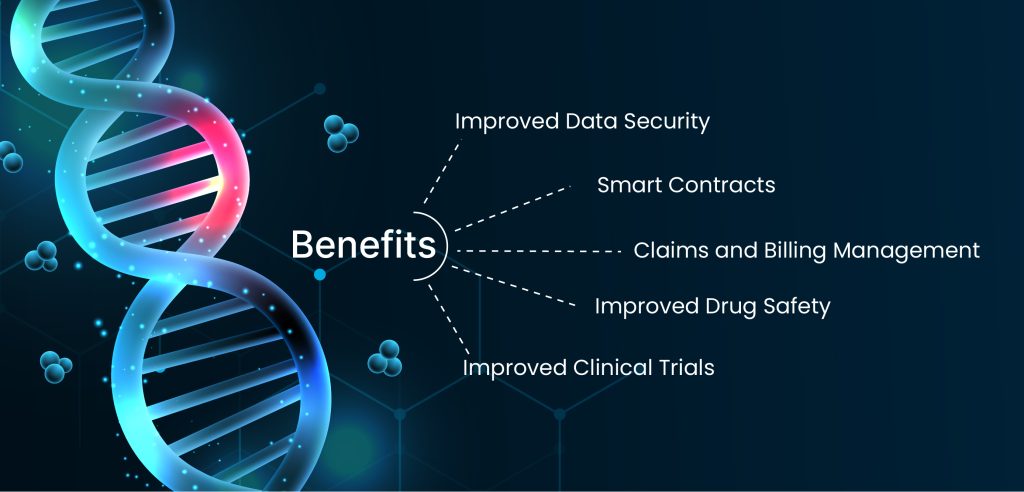Healthcare is a vital part of our society, and it is continuously evolving to meet the needs of patients and healthcare professionals. There has been a lot of buzz about blockchain technology and its potential to change healthcare. But is this just hype, or can blockchain really change healthcare? And how blockchain makes a difference in the healthcare industry?
With so much going on in the healthcare field, blockchain technology is not just hype; Big players like IBM, Microsoft, and Google are investing in blockchain research for healthcare.
PR Newswire reports that the global blockchain in healthcare market size is predicted to reach $7308.32 million by 2028, with an increased CAGR of 76.30% between 2021 to 2028.
Here, we will discuss how blockchain can revolutionize the healthcare sector, how it can provide benefits, and what challenges need to be overcome before blockchain can be widely adopted. So, without further ado, let us get started!
What is Blockchain in Healthcare?
Healthcare is a complex industry, with many different stakeholders involved in patient care. It includes doctors, hospitals, insurance companies, and even government agencies. Blockchain technology could streamline communication between all these parties, making it easier for them to exchange vital patient information.
For example, in the healthcare industry, blockchain is used to create a secure, decentralized platform for storing medical records. It allows patients to manage their health data from any location and makes it easier for medical professionals to access blockchain medical records.
In the past, several cases of sensitive medical data theft or hacking have been reported.
According to GlobeNewswire, more than 50.4 million patient records were breached in 2021.
However, these high numbers indicate that various actions are needed to help the healthcare industry resolve this issue. This is where blockchain technology in healthcare comes into play, as it increases transparency, reduces data fraud risks, and creates more efficient healthcare systems.
Ways Blockchain is Transforming the Healthcare Industry
In the healthcare industry, blockchain technology offers several benefits, including data security, data monitoring, and many more. In this section, we will discuss some of the key benefits and ways that this technology can improve the industry:

-
Improved Data Security
A blockchain is a distributed database that enables the secure, transparent, and tamper-proof management of healthcare data. In healthcare, blockchain technology can solve common issues like data breaches and fraud.
Blockchain technology allows patient data to be stored on a decentralized network instead of a central server. This makes it difficult for hackers to access or tamper with medical data.
Additionally, blockchain allows healthcare providers to exchange data with each other while maintaining patients’ privacy. Blockchain can also reduce fraud and corruption by auditing all transactions in the healthcare industry.
-
Smart Contracts
A blockchain-based smart contract can streamline several processes within healthcare. As an example, they can be used to process insurance claims, verify eligibility for benefits, or schedule appointments automatically.
A smart contract could be used to manage patient data and records, providing access to confidential information only to authorized individuals.
-
Claims and Billing Management
The claims and billing management process involves filing and processing a medical claim related to a patient’s diagnosis, medications, and treatments. There have been cases where medical files were compromised, which led to fraud and theft cases.
As blockchain technology works around recording medical data and storing it in an open digital ledger, anyone who is a member of the blockchain will be able to see changes to the data.
Many healthcare organizations have realized blockchain’s potential and are starting to implement it into their processes. Techspian always strives to develop user-centric software solutions. We are helping some of our clients create interactive medical billing software.
-
Improved Drug Safety
Every year, thousands of hospitalizations and deaths are caused by adverse drug reactions in the healthcare industry. And the cost of treating adverse drug reactions is estimated to be billions of dollars annually.
Blockchain technology is being used to track the provenance of drugs throughout the supply chain, and can also be used to track patient outcomes, which allows for the early detection of adverse reactions.
-
Improved Clinical Trials
A clinical trial process is often lengthy and complicated because numerous stakeholders are involved. As a result, this can lead to inefficiencies and delays, which can impact the success of clinical trials. Additionally, clinical trial data is often siloed, making sharing information difficult.
Blockchain technology has the potential to solve these problems by providing a secure and transparent way to store and manage clinical trial data. With blockchain technology, every step of the clinical trial process would be recorded on the blockchain, helping to track data and identify errors. Furthermore, blockchain could be used to verify the identities of patients and doctors, ensuring that clinical trial data is accessible only to authorized individuals.
“As per the Markets and Markets Report, the global clinical trials market size was valued at USD 38.7 billion in 2021 and is forecasted to grow to 52.0 billion by 2026, with a CAGR of 6.1%. there are several factors driving the growth of this market, such as the increasing number of clinical trials, the growing demand for outsourcing R&D, and drug commercialization.”
Blockchain Healthcare Applications
Here are a few real-world blockchain applications in the healthcare industry.
-
Electronic Health Records
One of the most important applications of blockchain technology is managing electronic health records. They have the potential to improve patient care, save lives and reduce costs. However, electronic health records also come with several challenges. One important major challenge is data security.
Currently, electronic health records are stored on central databases that are vulnerable to hacking and data breaches.
It puts patient data at risk of being compromised. This challenge can be addressed by using blockchain technology, which provides a decentralized, secure method of storing electronic health records. Blockchain technology allows patients to access their medical information 24/7, ensuring that only authorized individuals can view it. Many blockchain healthcare start-up companies are already working on blockchain-based electronic health record solutions to implement in their businesses.
An innovative country Estonia’s e-heath foundation partnered with Guardtime to store all health records secure and decentralized platform. As a result, doctors can easily access medical records anywhere at any time.
The UK-based blockchain healthcare company Medicalchain developed a platform that helps store health records and share health data securely. Another example Atlanta based company Patientory, which is working on a blockchain-based electronic health record solution for users to take control of their health outcomes.
-
Drug Traceability
A drug product’s traceability involves tracking it from manufacturer to patient throughout the supply chain. Blockchain technology system has the potential to transform drug traceability by providing an immutable record of drug product movements. Currently, most drug traceability systems rely on a centralized database that is vulnerable to tampering or hacking.
WHO estimates that 30% of medicines in parts of Latin America, Africa, and Asia can be counterfeit.
The blockchain system would provide a decentralized, tamper-proof record of all drug product movements. This would allow regulators to identify and recall counterfeit products.
Walmart, IBM, Merck, and KPMG collaborated to pilot a blockchain solution to help track pharmaceutical drugs throughout the supply chain.
-
IoT Security for Remote Monitoring
In the healthcare industry, the Internet of Things (IoT) is mainly used to monitor patients remotely. IoT devices like wearable sensors can collect data such as heart rate, body temperature, and blood pressure. This data is then sent to a central location for healthcare professionals monitoring.
However, IoT devices are not always secure, which makes them vulnerable to hackers and data breaches. It may cause serious concern in the healthcare industry, as hackers could steal patient data. Blockchain technology is the best solution to solve this problem by providing a secure way to store and share data.
A secure IoT network can be created using blockchain. For example, the IOTA platform provides a secure IoT environment. IOTA’s platform uses blockchain technology to create a tamper-proof data ledger for storing and tracking data from internet of things devices.
-
Medical Staff Credential Verification
Medical staff credential verification is another important application. Statista estimates that there are 1,073,616 licensed physicians in the United States. It can be challenging to verify the credentials of all medical professionals with such a large number.
A growing number of organizations are using blockchain technology to verify medical staff credentials. Blockchain technology allows organizations to verify the qualifications and experience of medical staff quickly and securely.
Additionally, blockchain technology provides a permanent record of credentials, which can be used to track medical staff career histories.
-
Supply Chain Management
In the healthcare industry, the supply chain is fragmented and complex. Management has limited oversight over the entire process, from drug creation to consumer delivery. Quality control and compliance are difficult to measure and enforce due to Heavy regulations.
Blockchains help to solve issues that are associated with supply chain management. It is immutability, allows manufacturers to track ingredients, and ensures compliance. Blockchain can also be used to track the origin of counterfeit drugs and devices. A lot of companies are developing blockchain-based solutions for the healthcare industry to solve these issues.
Chronicled, a US-based company, developed a platform that tracks medical supplies using blockchain and the internet of things.
-
Blood Plasma Supply Chain
In the healthcare industry, blockchain technology offers the potential to streamline plasma supply chains and provide up-to-date information to all stakeholders. Many life-saving treatments require plasma derivatives, and the current supply chain is complex. Several hospitals and blood banks across the globe are responsible for collecting, processing, and distributing plasma.
It is unfortunate that the system is often plagued by inaccuracies and inefficiencies, leading to critical shortages of plasma when patients need it most. “Blockchain in Healthcare Today” study predicted that the plasma supply chain market is growing rapidly and is forecast to reach $15.5 billion by 2024.
Thus, blockchain provides a solution to these problems by providing a decentralized platform on which all stakeholders can share information and track plasma shipments in real-time. In this way, blockchain could ensure that lifesaving treatments are always available to patients.
Canadian Blood Services (CBS) collaborated with EY Canada to use blockchain technology to provide real-time traceability and visibility of blood products throughout the system.

-
24/7 Data Monitoring
In the healthcare sector, monitoring data is crucial when it comes to managing and optimizing electronic health records. Patient data, such as blood pressure readings and doctors’ prescriptions, needs to be monitored and accessible 24 hours a day. Unfortunately, existing healthcare infrastructure does not have these capabilities because of interoperability issues, data breaches, and so on.
This is where blockchain comes in. It provides 24/7 data availability and helps to improve electronic health records management with its distributed nature. Also, blockchain helps solve the interoperability issue by providing a standardized platform for data sharing between different healthcare providers.
Challenges of Blockchain Technology in the Healthcare Industry
Blockchain technology offers several potential benefits for healthcare but there are several challenges involved to implement it.
-
HIPAA Compliance and data privacy regulations
HIPAA (Health Insurance Portability and Accountability Act) is a US healthcare law that sets strict guidelines for how patient data can be used and shared.
Blockchain technology can help healthcare organizations comply with HIPAA. Despite this, it is still unclear how blockchain technology can be used in a way that is compliant with these regulations.
-
Data Immutability
Blockchain does not allow changes to be made once the information is uploaded. While on the one hand immutability guarantees increased security, on the other hand, it also limits scalability.
This immutability problem would need to be resolved by either extending the current architecture to enable the recording of modifications or, in the short term, by using on-chain and off-chain data partitioning.
-
Scalability
The Scalability of the blockchain system is also a limitation, as the number of blocks increases the system becomes slower and requires more computing power. This can be more complicated in an IoT environment where the flow of data needs to be instantaneous.
Wrapping Up….
The Healthcare infrastructure does not have the proper mechanisms for exchanging medical data. In turn, the blockchain offers new approaches to data storage used in many digital healthcare systems. All thanks to blockchain technology opportunities to segment, transfer, and secure information in a completely new way.
At Techspian, we have worked on several blockchain-based projects aiming to aid our healthcare clients. Our team has provided breakthrough IT solutions in the areas of drug delivery, claims and bill management, and electronic health data management in focus.
If you want to implement blockchain solutions in your healthcare organization, contact us today for more details! Our IT healthcare expert will use their best practices and knowledge to build a custom medical application and help you to achieve your business goals as quickly as possible.



